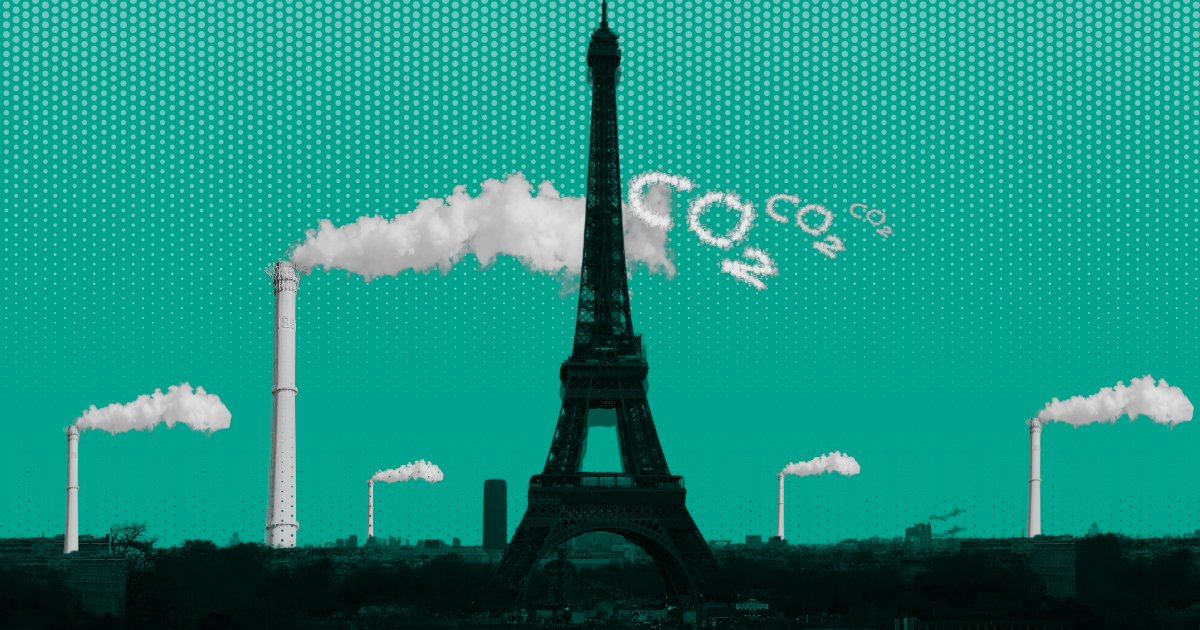
Carl Edward Rasmussen
Professor of Machine Learning, Cambridge University
When it was signed, the Paris Agreement was widely hailed as a “historic breakthrough.” But how good is it really at mitigating the effects of climate change?
The Paris Agreement is a United Nations Framework Convention for Climate Change (UNFCCC) agreement, negotiated in Paris in December 2015 and adopted in November 2016. The agreement is long. One of the UNFCCC agreement’s substantial statements, Article 2.1(a), states that the parties agree to hold “the increase in the global average temperature to well below 2°C above pre-industrial levels and pursuing efforts to limit the temperature increase to 1.5°C above pre-industrial levels, recognizing that this would significantly reduce the risks and impacts of climate change.”
Global temperature depends on many factors; the primary factor under human control is the concentration of greenhouse gases in the atmosphere, most importantly carbon dioxide and methane. To limit the temperature rise, we must reduce the concentration of greenhouse gases. We all benefit from activities which release greenhouse gases. So, the nature of the problem is: how do we cooperate to manage our shared atmospheric resource?
Despite near global ratification, the Paris Agreement is failing. Nearly nine years after its adoption, atmospheric greenhouse gas concentrations continue to rise, with both carbon dioxide and methane concentrations rising faster now than they did nine years ago. To stabilize temperature, the rate of greenhouse gas concentration increase must be zero. The text of the agreement is too vague to determine when +1.5°C was or will be breached. But there is little doubt that, under any reasonable interpretation, we're on a path to violating both limits.
Why is the agreement failing? The answer lies in its flawed design, particularly its failure to foster cooperation. Fortunately, we know a lot about the conditions for effective cooperation. In her book “Governing the Commons,” political theorist Elinor Ostrom identifies key necessary conditions: binding commitments, mutual trust, transparency, reciprocity and enforceable sanctions. The Paris Agreement lacks every one of these properties, guaranteeing failure. Let's examine the details.
The commitment to hold the temperature below the limits is collective, but no participant takes responsibility for anything (in terms of emissions) individually. Anyone with practical organizational experience knows that relying solely on collective responsibility is a recipe for failure.
The Paris Agreement is built around Nationally Determined Contributions (NDCs), which are lists of national emission targets specified every five years, looking 10 years into the future. NDCs are technically annexes to the agreement, and therefore not legally binding. It is hoped that countries will abide by their NDCs and will strengthen (ratchet up) ambition over time, but there are no meaningful consequences if not.
The 10-year timelines for the NDCs creates mistrust between partners. That is because the only way to know whether your partners will honor their NDCs is to wait and see. I live in the UK, which has submitted ambitious NDCs (emissions of ~3.7 tons per person per year in 2030 and ~2.2 tons per person per year in 2035, compared to current global average of ~5.0 tons per person per year). But the UK government's own independent advisory body, the Climate Change Committee, says that the UK is not on track to comply. What are our international partners to make of that?
Climate change is now much too urgent to wait for prolonged periods to see if your partners can be trusted."

Carl Edward Rasmussen
Professor of Machine Learning, Cambridge University
The free form nature of the NDCs is unfortunate, as it makes principled comparisons between countries difficult. This greatly reduces transparency and makes reciprocal agreements (I will if you will) close to impossible. Also, most countries phrase their NDCs in terms of relative reductions compared to some baseline year, rather than comparable absolute per capita emissions. The language of relative reductions implicitly grants higher absolute allowances for historically large emitters. Surely, the opposite would be desirable? I.e., those who caused the problem should contribute more to solving it.
We've listed some of the fundamental reasons why the Paris Agreement is failing, but can it be fixed? Or is climate change fundamentally intractable to human societies? It may not be trivial to fix, but certainly any attempt needs to address the issues we've highlighted above.
The most pressing issue is surely the introduction of binding commitments. Concerns have been raised that sovereign nations will not enter into binding agreements with short term economic impact. This objection completely fails to appreciate the power of cooperation. Climate cooperation does not mean distributing wealth to foreign countries but securing conditions for your own prosperous future. Even if intervention incurs costs up front, very large future expenses associated with unchecked climate change will be avoided. Because climate change influences so many aspects of life, it is very difficult to obtain accurate estimates of their magnitude. All investments, not just ones in climate change mitigation, face some uncertainty.
But no one will be tempted to cooperate without a strong, binding framework to do so. The Paris Agreement relies, it seems, mostly on hope—that other players will play their part. And that is a laughably weak motivation for having to change entire country wide energy systems. Instead, we need binding, transparent, reciprocal and trust building agreements, which guarantee that partners do their fair share.
Common Pool Resource problems, like our shared atmosphere, suffer from the free-rider problem. Non-cooperators will benefit from reduced climate change, even if they do not contribute to mitigation. What can be done about this? If you believe in equitability of our shared atmospheric resource, then free riding is ethically bankrupt, and not acceptable behavior. Responding to free riding by refusing to cooperate yourself, hands victory to the selfish. Instead, the cooperative must sanction free riding, for example by boycotts and trade barriers. A cooperative agreement can be successful with large but not universal membership. The Paris Agreement is often lauded for its near global adoption, but what use is an ineffectual agreement with global membership? In fact, global membership is a dangerous desire, since it gives possible defectors too much leverage.
An effective agreement must be a coalition of the willing with sanctions for dissenters."

Carl Edward Rasmussen
Professor of Machine Learning, Cambridge University
Older people will be dead when the worst effects of climate change materialize, but younger people don't share this advantage. Many young people are therefore understandably concerned about climate change and often express this by protesting. But you cannot just be against the status quo; you must also be for something. Effective cooperative agreements would be a constructive rallying call.
In conclusion, where do we stand? To progress, we must first acknowledge that the foundations of the Paris Agreement are fundamentally at odds with solving the problem. Not only is the current agreement failing, but because it is widely regarded as the only game in town, its existence is blocking more effective ideas. The Paris Agreement creates a dangerous illusion of progress while perpetuating failure. In its current form, it may be doing more harm than good. We urgently need to supplement the agreement with effective cooperative mechanisms. It's our choice to make.
